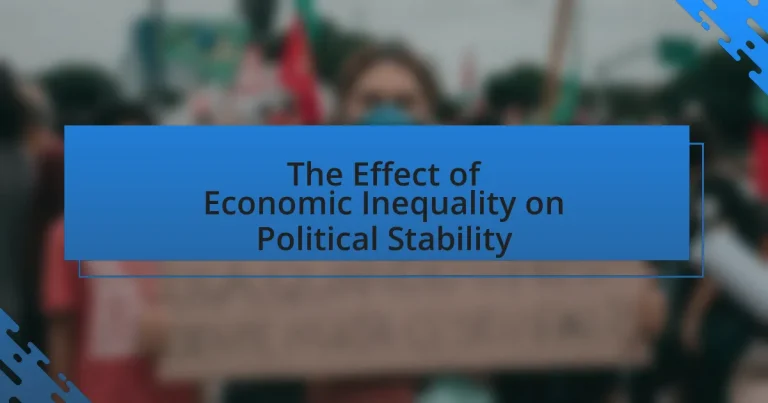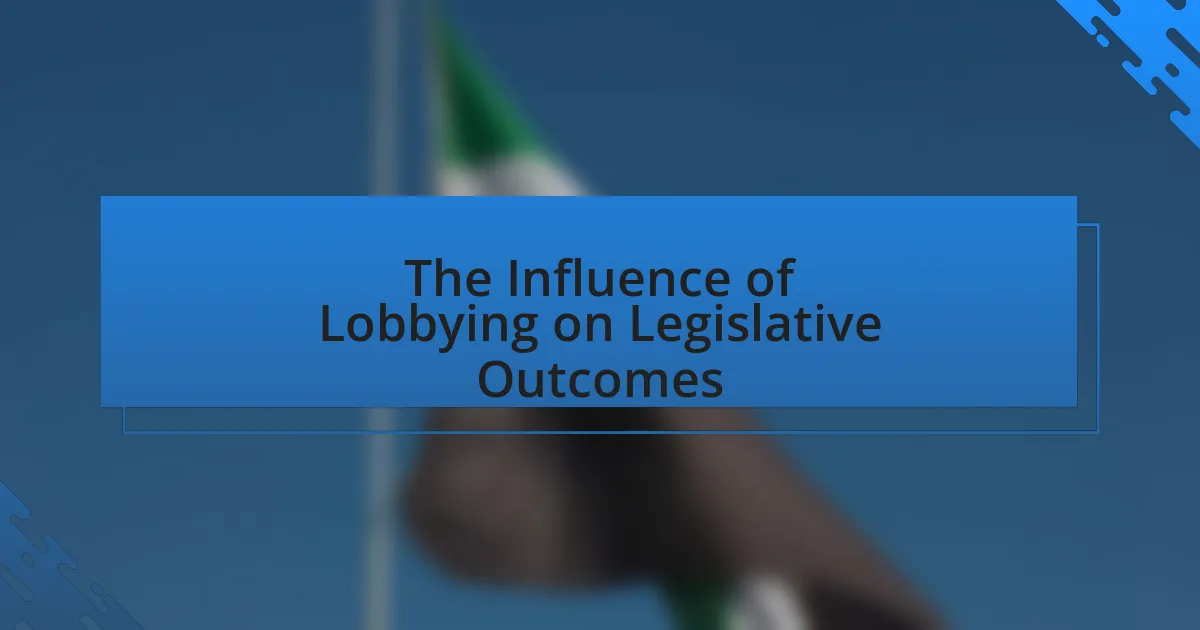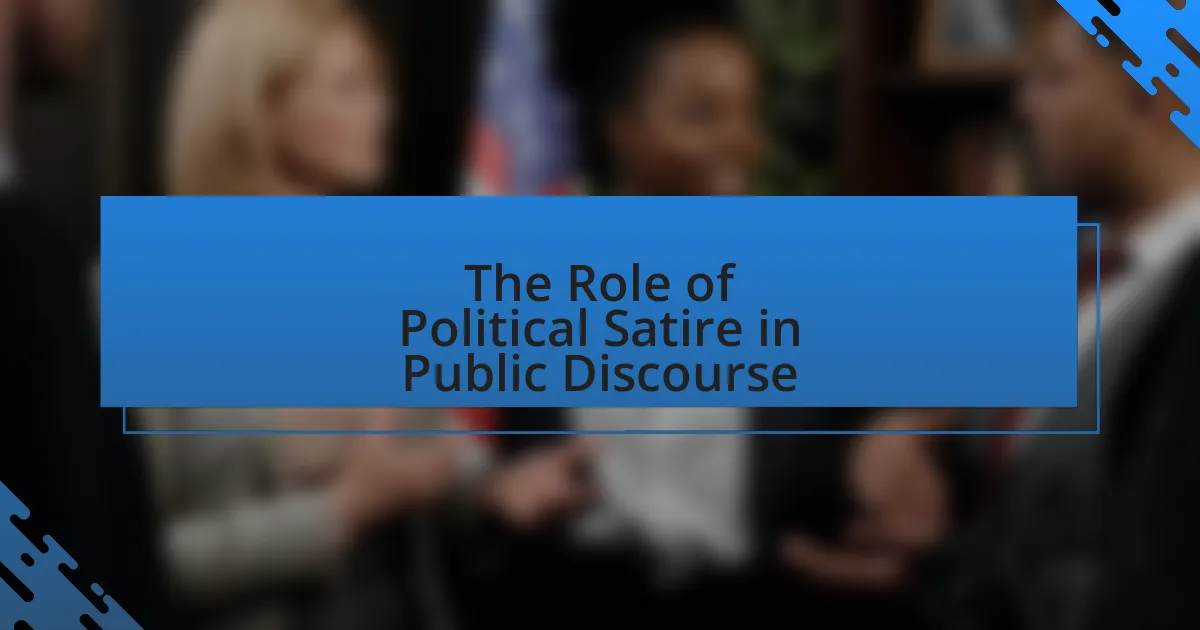The article examines the relationship between economic inequality and political stability, highlighting how disparities in wealth and opportunity can lead to social unrest and diminished trust in institutions. It outlines various forms of economic inequality, including income, wealth, and opportunity inequality, and discusses their impact on different social classes and voter behavior. The article also emphasizes the importance of political stability for economic growth and governance, detailing how effective policies, such as progressive taxation and enhanced social safety nets, can mitigate the adverse effects of inequality. Historical examples illustrate the consequences of unchecked economic disparities, demonstrating the need for equitable economic policies to maintain political stability.
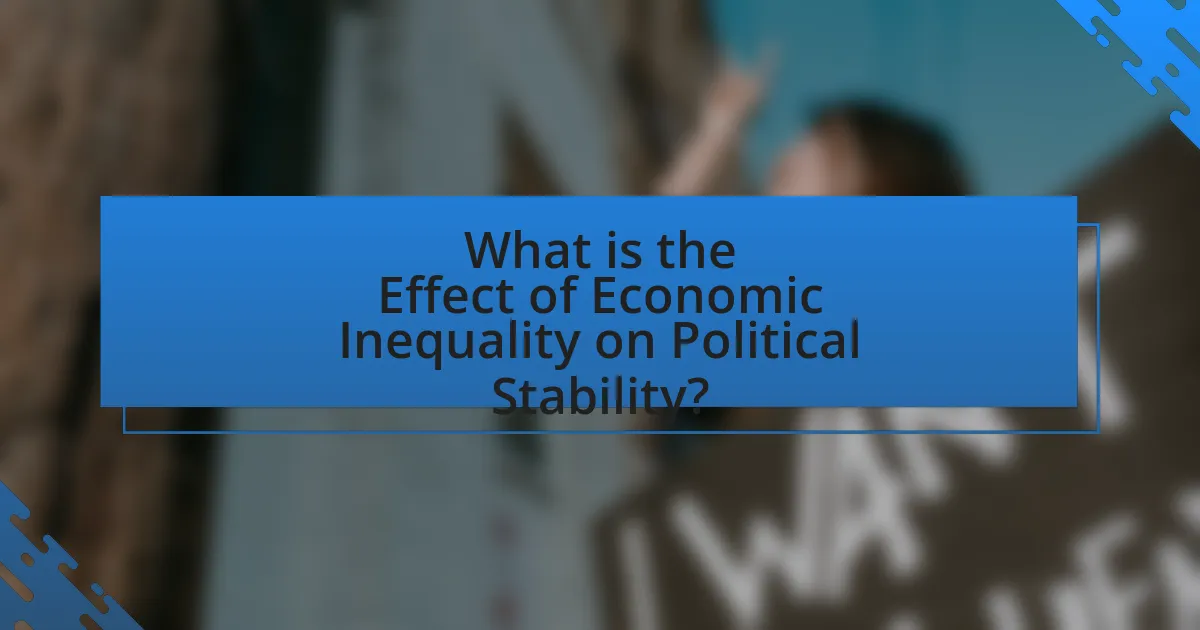
What is the Effect of Economic Inequality on Political Stability?
Economic inequality negatively affects political stability by fostering social unrest and undermining trust in institutions. High levels of inequality can lead to increased dissatisfaction among lower-income groups, resulting in protests and political mobilization against perceived injustices. For instance, research by the International Monetary Fund indicates that countries with higher income inequality experience more frequent political instability, as marginalized populations feel excluded from economic opportunities and political processes. This correlation is evident in various historical contexts, such as the Arab Spring, where economic disparities contributed to widespread protests and regime changes.
How does economic inequality manifest in societies?
Economic inequality manifests in societies through disparities in wealth, income, and access to resources, leading to social stratification. For instance, the top 1% of earners in the United States held approximately 16 times more wealth than the bottom 50% in 2020, illustrating significant wealth concentration. This inequality can result in limited access to education and healthcare for lower-income groups, perpetuating cycles of poverty and reducing social mobility. Additionally, economic inequality often correlates with increased crime rates and social unrest, as marginalized populations may feel disenfranchised and excluded from economic opportunities. Studies, such as those conducted by the OECD, indicate that higher levels of income inequality can negatively impact overall economic growth and political stability, as societies with greater inequality tend to experience more political polarization and conflict.
What are the different types of economic inequality?
The different types of economic inequality include income inequality, wealth inequality, and opportunity inequality. Income inequality refers to the uneven distribution of earnings among individuals or groups, often measured by metrics such as the Gini coefficient, which quantifies income distribution disparities. Wealth inequality encompasses the unequal distribution of assets, including property and investments, highlighting the gap between the rich and the poor in terms of total net worth. Opportunity inequality pertains to the disparities in access to resources and opportunities, such as education and employment, which can perpetuate economic disparities across generations. These types of economic inequality can significantly impact political stability, as they may lead to social unrest and decreased trust in institutions.
How do these types impact various social classes?
Economic inequality impacts various social classes by exacerbating disparities in wealth, access to resources, and political influence. For instance, higher economic inequality often leads to a concentration of wealth among the upper class, which can diminish the political power and social mobility of lower-income groups. Research indicates that countries with significant income inequality, such as the United States, experience increased social unrest and political polarization, as marginalized classes feel disenfranchised and excluded from decision-making processes. This dynamic can destabilize political systems, as evidenced by the rise of populist movements that challenge established political norms in response to perceived inequities.
Why is political stability important for a nation?
Political stability is crucial for a nation because it fosters economic growth, social cohesion, and effective governance. Stable political environments attract foreign investment, as investors seek predictable conditions for their capital. For instance, according to the World Bank, countries with stable political systems experience higher GDP growth rates compared to those with political turmoil. Furthermore, political stability reduces the likelihood of civil unrest and conflict, which can disrupt economic activities and lead to significant losses. Historical examples, such as post-war Germany, illustrate how political stability can facilitate recovery and development, reinforcing the importance of a stable political framework for national prosperity.
What factors contribute to political stability?
Political stability is primarily influenced by effective governance, social cohesion, and economic performance. Effective governance ensures the rule of law, transparency, and accountability, which fosters trust in institutions. Social cohesion, characterized by a sense of belonging and shared identity among citizens, reduces conflict and promotes cooperation. Economic performance, including equitable growth and low unemployment, contributes to stability by addressing grievances related to inequality. Historical examples, such as the Nordic countries, demonstrate that strong welfare systems and inclusive policies lead to high levels of political stability, as they mitigate the effects of economic inequality and promote social trust.
How does political stability affect economic growth?
Political stability positively affects economic growth by creating an environment conducive to investment and development. When a country experiences political stability, it typically enjoys consistent policies, reduced uncertainty, and enhanced investor confidence, which are crucial for economic activities. For instance, according to a study by the World Bank, countries with stable political environments tend to attract more foreign direct investment, leading to increased capital inflow and job creation. Additionally, stable governance allows for better implementation of economic policies and infrastructure development, further driving growth. Historical examples, such as Singapore and Switzerland, illustrate how political stability correlates with sustained economic prosperity, as both nations have maintained stable governments that foster economic innovation and resilience.
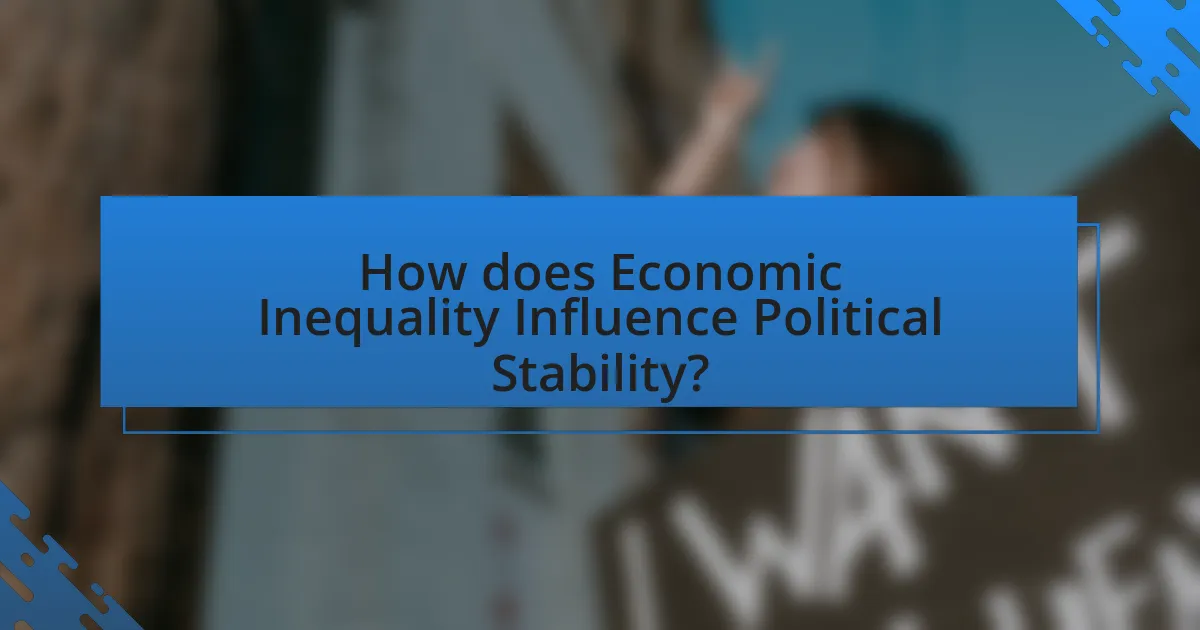
How does Economic Inequality Influence Political Stability?
Economic inequality significantly influences political stability by fostering social unrest and undermining trust in institutions. When wealth is concentrated in the hands of a few, it often leads to feelings of disenfranchisement among the majority, which can result in protests, riots, or even revolutions. For instance, the Arab Spring, which began in 2010, was partly fueled by widespread economic disparities and high unemployment rates, leading to political upheaval in several countries. Additionally, research by the International Monetary Fund indicates that higher levels of income inequality can correlate with increased political instability, as marginalized groups may resort to extreme measures to voice their grievances. This relationship underscores the critical impact of economic inequality on maintaining a stable political environment.
What are the direct effects of economic inequality on political systems?
Economic inequality directly undermines political systems by fostering social unrest, eroding trust in institutions, and skewing policy outcomes in favor of the wealthy. High levels of economic disparity can lead to increased political polarization, as marginalized groups feel disenfranchised and less represented, which can manifest in protests or civil disobedience. For instance, research by the International Monetary Fund indicates that countries with greater income inequality experience lower levels of political stability and higher incidences of conflict. Additionally, economic inequality can result in lobbying and campaign financing that disproportionately favors affluent individuals and corporations, thereby shaping legislation to benefit the wealthy at the expense of broader societal needs. This dynamic creates a feedback loop where political power becomes concentrated, further entrenching inequality and destabilizing democratic processes.
How does economic inequality lead to social unrest?
Economic inequality leads to social unrest by creating disparities in wealth and opportunity that foster resentment among disadvantaged groups. When a significant portion of the population feels excluded from economic benefits, it can result in frustration and anger, which may manifest as protests or riots. Historical examples include the 2011 London riots, where economic disparities and austerity measures were cited as contributing factors. Additionally, research from the International Monetary Fund indicates that higher levels of income inequality correlate with increased social tensions and instability, as marginalized communities demand greater equity and justice.
What role does economic inequality play in voter behavior?
Economic inequality significantly influences voter behavior by shaping political preferences and engagement levels. Individuals from lower economic strata often feel disenfranchised, leading to lower voter turnout and a tendency to support populist or radical parties that promise systemic change. Research indicates that in the United States, areas with higher income inequality, such as those highlighted in the 2019 report by the Economic Policy Institute, show a correlation with decreased electoral participation among lower-income voters. This trend suggests that economic disparities can create a divide in political engagement, where wealthier individuals are more likely to vote and influence policy outcomes, thereby perpetuating the cycle of inequality.
How do different political ideologies respond to economic inequality?
Different political ideologies respond to economic inequality in distinct ways, reflecting their foundational beliefs about the role of government and individual responsibility. For instance, liberalism typically advocates for government intervention to reduce inequality through progressive taxation and social welfare programs, as evidenced by policies implemented in Scandinavian countries, which have some of the lowest levels of income inequality globally. In contrast, conservatism often emphasizes free-market principles, arguing that economic inequality is a natural outcome of individual effort and innovation, as seen in the United States, where policies favoring deregulation and tax cuts for the wealthy have been justified on the grounds of promoting overall economic growth. Socialism, on the other hand, directly challenges the structures that create inequality, advocating for the redistribution of wealth and resources, exemplified by the nationalization of key industries in countries like Venezuela, which aimed to address disparities but faced significant economic challenges. Each ideology’s approach to economic inequality reflects its broader views on justice, equity, and the role of the state in society.
What are the responses of leftist ideologies to economic inequality?
Leftist ideologies respond to economic inequality by advocating for wealth redistribution, social welfare programs, and progressive taxation. These approaches aim to reduce the wealth gap and promote social equity. For instance, socialist movements emphasize collective ownership of resources and the means of production, arguing that this structure can eliminate class distinctions and ensure that wealth benefits the broader population rather than a select few. Historical examples include the implementation of welfare states in Scandinavian countries, which have successfully reduced poverty rates and income inequality through comprehensive social safety nets and high taxation on the wealthy. Additionally, leftist ideologies often support labor rights and minimum wage increases as mechanisms to empower workers and ensure fair compensation, further addressing economic disparities.
How do right-leaning ideologies address economic disparities?
Right-leaning ideologies typically address economic disparities through policies that emphasize free-market principles, individual responsibility, and limited government intervention. These ideologies argue that economic growth driven by capitalism creates opportunities for wealth generation, which can ultimately reduce disparities. For instance, proponents of right-leaning policies often cite the success of tax cuts and deregulation in stimulating economic growth, as seen in the United States during the Reagan administration, where tax reforms led to significant GDP growth and job creation. Additionally, right-leaning perspectives often advocate for social safety nets that encourage self-sufficiency rather than dependency, suggesting that empowering individuals through education and job training can effectively address economic inequalities.
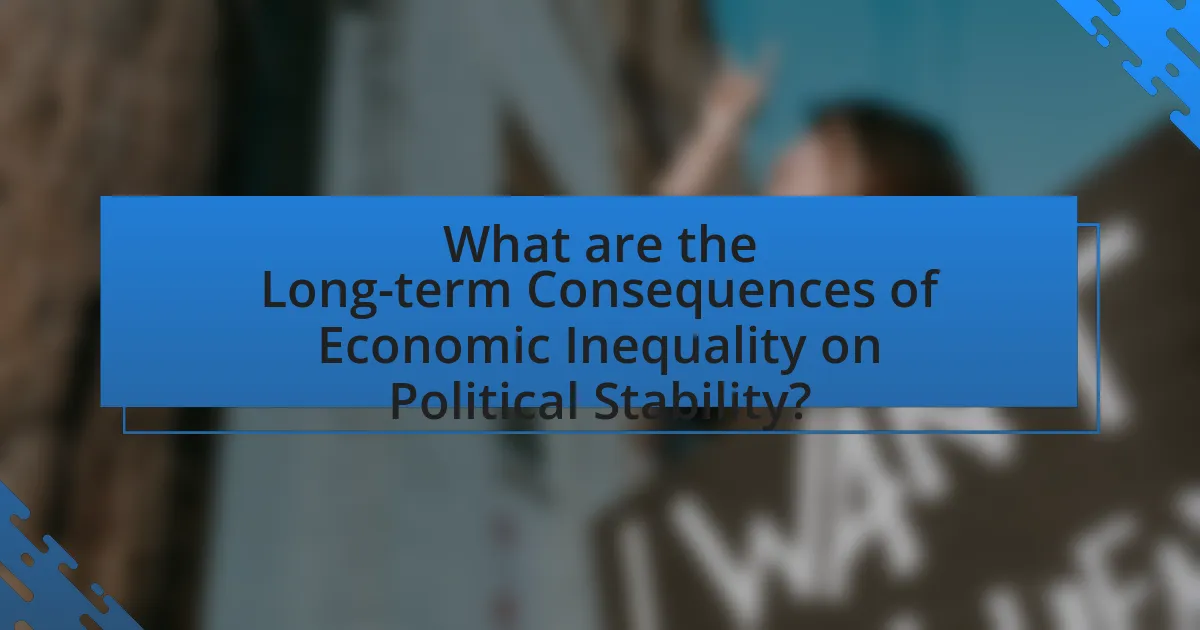
What are the Long-term Consequences of Economic Inequality on Political Stability?
Economic inequality leads to long-term political instability by fostering social unrest and eroding trust in institutions. When wealth is concentrated in the hands of a few, marginalized groups often feel disenfranchised, which can result in protests, riots, and increased crime rates. For instance, studies have shown that countries with high levels of income inequality, such as Brazil and South Africa, experience more frequent social conflicts and political upheaval. Additionally, economic inequality undermines democratic processes, as wealthier individuals and corporations can exert disproportionate influence over political decisions, leading to policies that favor the elite and further alienate the lower-income population. This cycle of discontent can destabilize governments and hinder effective governance, ultimately threatening the overall political stability of a nation.
How does economic inequality affect governance and policy-making?
Economic inequality significantly undermines governance and policy-making by concentrating power and resources in the hands of a few, which can lead to biased policies that favor the wealthy. This concentration of wealth often results in reduced political participation among lower-income groups, as they may feel disenfranchised and less represented in decision-making processes. For instance, research by the International Monetary Fund indicates that higher levels of income inequality can lead to lower levels of trust in government and institutions, which in turn can destabilize political systems. Furthermore, economic inequality can skew policy priorities towards the interests of the affluent, as seen in tax policies that disproportionately benefit higher income brackets, thereby exacerbating the inequality itself.
What policies can mitigate the effects of economic inequality?
Progressive taxation can mitigate the effects of economic inequality by redistributing wealth from higher-income individuals to fund social programs. This approach has been shown to reduce income disparities; for instance, countries with progressive tax systems, like Sweden, have lower levels of income inequality compared to those with flat tax rates. Additionally, increasing access to quality education and healthcare can empower lower-income populations, enabling upward mobility and reducing economic gaps. Research indicates that investments in education lead to higher earnings potential, thus contributing to a more equitable society. Furthermore, implementing a living wage policy ensures that all workers receive compensation that meets basic living standards, which can alleviate poverty and reduce inequality. Studies have demonstrated that regions with higher minimum wages experience less income inequality and improved economic stability.
How do these policies influence political stability?
Economic policies that exacerbate inequality can significantly undermine political stability. When wealth is concentrated among a small elite, it often leads to social unrest, as marginalized groups feel disenfranchised and excluded from economic opportunities. Historical examples, such as the Arab Spring, illustrate how economic disparities can trigger widespread protests and political upheaval. Additionally, research by the International Monetary Fund indicates that higher levels of income inequality correlate with increased political instability, as citizens demand more equitable distribution of resources and representation. Thus, policies that fail to address economic inequality can create an environment ripe for conflict and instability.
What lessons can be learned from historical examples of economic inequality and political instability?
Historical examples of economic inequality and political instability demonstrate that significant disparities in wealth can lead to social unrest and governmental collapse. For instance, the French Revolution of 1789 was largely fueled by the stark economic divide between the aristocracy and the impoverished Third Estate, resulting in widespread violence and the eventual overthrow of the monarchy. Similarly, the economic turmoil in Weimar Germany post-World War I, characterized by hyperinflation and unemployment, contributed to the rise of extremist political movements, ultimately leading to the establishment of a totalitarian regime under Adolf Hitler. These instances illustrate that unchecked economic inequality can erode trust in institutions, provoke civil discord, and destabilize governments, emphasizing the need for equitable economic policies to maintain political stability.
Which countries have experienced significant political instability due to economic inequality?
Countries that have experienced significant political instability due to economic inequality include Venezuela, Brazil, and South Africa. In Venezuela, the economic crisis exacerbated by inequality has led to widespread protests and political unrest since 2014. Brazil has faced political turmoil, particularly during the impeachment of President Dilma Rousseff in 2016, which was influenced by rising inequality and public discontent. South Africa has seen increased social unrest and protests against economic disparities, particularly following the Marikana miners’ strike in 2012, highlighting the ongoing tensions related to inequality.
What strategies were effective in restoring stability in these cases?
Effective strategies for restoring stability in cases of economic inequality include implementing progressive taxation, enhancing social safety nets, and promoting inclusive economic policies. Progressive taxation redistributes wealth, reducing income disparities and fostering social cohesion. For instance, countries like Sweden and Denmark have successfully utilized high tax rates on the wealthy to fund comprehensive welfare programs, which have contributed to lower levels of inequality and greater political stability. Enhancing social safety nets, such as unemployment benefits and healthcare access, mitigates the adverse effects of economic downturns on vulnerable populations, thereby reducing social unrest. Additionally, promoting inclusive economic policies that encourage job creation and equitable access to resources can help bridge the gap between different socioeconomic groups, as evidenced by initiatives in countries like Germany that focus on vocational training and apprenticeships, leading to lower unemployment rates and increased social stability.
What practical steps can be taken to address economic inequality and enhance political stability?
Implementing progressive taxation is a practical step to address economic inequality and enhance political stability. By increasing tax rates on higher income brackets, governments can redistribute wealth more equitably, funding social programs that benefit lower-income populations. For instance, countries like Sweden and Denmark have successfully utilized progressive tax systems to reduce income disparity, resulting in lower poverty rates and increased social cohesion. Additionally, investing in education and job training programs can empower disadvantaged groups, fostering economic mobility and reducing tensions that arise from inequality. Research indicates that nations with higher levels of education and workforce skills experience greater political stability, as citizens feel more engaged and less marginalized.
